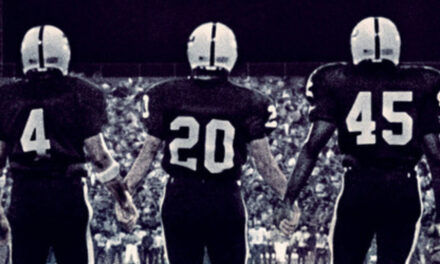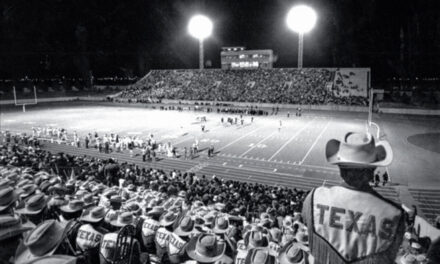Young ahletes & parents need to listen to Louisiana Lafayette baseball head coach Tony Robichaux’s thoughts on “daddy ball.” pic.twitter.com/tjlZL8hpVy
— Baseball Fam (@ShtBallPlayrsDo) April 14, 2017
University of Louisiana Head baseball coach Tony Robichaux talks about “Parents, Playing Time, Daddy Ball, and Entitlement” and how it’s hurting youth sports.
Marc Negrin a veteran in the Long Island football community weighed in on the topic along with four other notable youth football coaches. Marc is a Suffolk County PAL Board Member, President of Pat-Med Youth Football, and one of the most respected referees on Long Island.
What do you think? Tell us in the comments below, and also tell us on Facebook.
Marc Negrin, Board Trustee Suffolk County PAL, President of Pat-Med Youth Football, and Respected Referee
I agree. Some parents want to shelter their children from heartache and from the agony of defeat. The reality is, that heartache and agony are what fuels true competition. You have to know how bad it hurts to fail in order to truly strive to succeed. What’s the alternative? Sitting at home playing Xbox? I don’t care what sports my kids play, but they’re playing something every season. Sadly, that thinking is becoming less and less prevalent.
Benjamin Carey, Northport Tigers
The entitlement mindset is becoming an epidemic in this instant gratification technology driven world. You spend time developing and getting better in practice, not in games. All kids should get a reasonable amount of playing time in games at the very young ages, but completely equal playing time is instilling the wrong value system. It’s simply not a rule of life. — There are lessons in life to learn early, and things aren’t always equal is one of them. There is a growing “opt-out” mentality in society today that was never around in our generation. There’s no daily pledge of allegiance in school, no cupcakes allowed to be brought in for birthdays, no picking teams to the last person in gym class, no dodgeball, no Christmas concerts, no weekly spelling tests, no penmanship exercises, and no more dropping the kids off at practice. Instead parents stay for the whole practice and scrutinize from the sideline. Kids have less social skills because mommy and daddy arrange every playdate and social interaction possible to make sure things go just the way they want for little Johnny.
Vincent Cesarino, Pat-Med Raiders
I agree with Ben. Society in today’s time lives in an unrealistic world. They are showing today’s youth that there’s no need to work hard at anything let alone sports. They are being shown that they will be rewarded if they just show up. The playing field is not equal in sports nor life. The children of today’s world are being sheltered from that concept and when that harsh concept becomes a reality they shut down and have no idea on how to rationally cope with what is going on (i.e. Shutting down university classes because of a presidential candidate losing an election). There’s no doubt that we all grew up in a seemingly complete different era. We were taught at a young age if you want something, be it playing time on a sports team or any type of promotion or award that you have to set your goals, work diligently towards those set goals and that eventually hard work would pay dividends in one way or another. I have to be honest, I still do that for myself now and I try to instill that in my own children as well as the boys on my team. I have a “day one” meeting with parents and players to start every season. I lay down everything my coaches and I expect from not only the players but the parents as well. I tell my boys every season (and they are tired of hearing it) that the only promise I make in playing time and positions is that there aren’t any promises! I don’t care how much you played last season nor the position you played. I make them aware that I did NOT give that to them and that they EARNED it. We coach that playing time is NOT decided by the coaches on the team but rather the players on the team. We coach the value of hard work. We coach the value of dedication. We instill an ideology of “commit to win” not only in a football game but in every single aspect of their lives. Believe it or not after a while my boys crave the work at practice. They look forward to pushing themselves to see what they can achieve. They crave the structure and the discipline we set forth on that field, so much so that parents notice improvements in school work and overall behavior. They pride themselves on being the first ones on and the last ones off. My goal when I decided to become a coach 15 seasons ago was to create an environment where hard work meets discipline and discipline meets structure in a world where those very same components rarely seem to exist anymore. My personal goals have always been that when my boys move on from me and our program that they have learned the value of something rather than just the cost and hope that they carry that with them in all of their endeavors regardless if they ever step foot on a football field again. As we all know this is life gents not just football!!
Agha Ali, Huntington Bulldogs
I agree 100%, very well put Benjamin J. Carey, and Tim Asbell. These lessons at a young age are what the foundation is going to be built upon. Do not set your own child or anyone else’s child up for failure. These values learned from a young age are true life lessons which stay with an individual throughout their life. NOTHING IS HANDED TO YOU IN REAL WORLD – You have work your rear end off to get to where you want. “Daddy Ball” practiced by any coach is a failure to the coach and to the child! My personal belief: be harder on ur own child, show others that there is no favoritism by actions not words, win your spot weekly as a player, No Sugar Coating – be honest and provide feedback and set expectations!
- Their child calls them “Coach” at practice.
- Are harder on their own child than anyone on the team, and have to remind themselves to ease up in order to not have an adverse effect on their own kid.
- They don’t hide their criticism of their own child, they express it openly.
- They take their child regularly to contests and events to be rated independently by other coaches.
- Their favorites aren’t necessarily the stars of the team. They coach for the love of making a difference, and their favorites are therefore the underdogs whereby they can be of the most help and make the biggest improvement.
- They make sure everyone gets a chance to play, but they coach to win. That is what dictates the share of playing time. (direct parallels with life)
- When they are not coaching their child directly; they are okay dropping their child off at practice and and returning two hours later. They don’t feel the need to have to sit on the sideline and scrutinize every move of the coaching staff, nor do they feel it necessary to coach their child in every sport.
- Their child works hard doing things outside of practice and outside of the regular season to become a better player.
- They tell their child that conflict is part of life. If their child has a conflict with another player or coach they tell them to talk and work it out, and that throughout life wherever they go there will be players, coaches, teachers, and bosses that they are not going to like. It’s part of life; deal with it.
- They would rather have their child on a great team in a high division surrounded by talent and having to work hard to keep up rather than be in a lower division running over less able players.
- They tell their child to work hard to earn their playing time. Simple as that.
- They never quit, under any circumstances.
- Their child calls them “Dad” at practice.
- Has an unrealistic view of child’s abilities.
- Complains about playing time instead of explaining and putting the onus on their child to earn their playing time.
- Their own child and personal favorites get the bulk of playing time, not the performers.
- Does not take their child for “independent” evaluations/contests out of their control.
- Must coach his child in every sport. Is afraid to let his child stand on his own.
- Allocating playing time for his child and favorites takes precedence over winning.
- Favors his child, makes excuses. Asks other coaches for favors on playing time and roster spots if he’s not coaching the child directly.
- Praises their child for everything and makes excuses for them or blames others when they fall short in their responsibilities.
- They would rather their child be the all-star running over people in a low talent team and division, instead of being surrounded by the best and having to work hard to keep up.
- They do nothing in the off-season or outside of practice to improve, and as a defense mechanism they call anyone who does “over-the-top”.
- When not coaching their child directly; calls his child’s head coach incessantly in order to try and manage the relationship and his child’s playing time. Patronizes him often laying on comments like “you’re Johnny’s favorite coach”.
- Jumps at every opportunity to point out negatives and errors of teammates. In extenuating cases calls other players bullies. Anything to make excuses for his child’s dislike of contact in football.
- When not coaching his child directly he takes every opportunity to stir up sideline banter and a cancerous culture.
- They quit. Leaves the team and/or program when things don’t go their way teaching their child to give up during difficulties rather sticking it out and teaching their child valuable life lessons like loyalty and commitment.






Great article, Marc Alan Negrin! You represent our community and children with such pride! Thank you.
We see so much bad PARENT behavior, it's discouraging and stressful.
Excellent article.. having come from Miami and DC i have a very small sample size of the youth football on LI.. More specifically Jr High Football on LI. is there a place were i can find who is driving the boat and why its run the way it is??
Excellent Article!